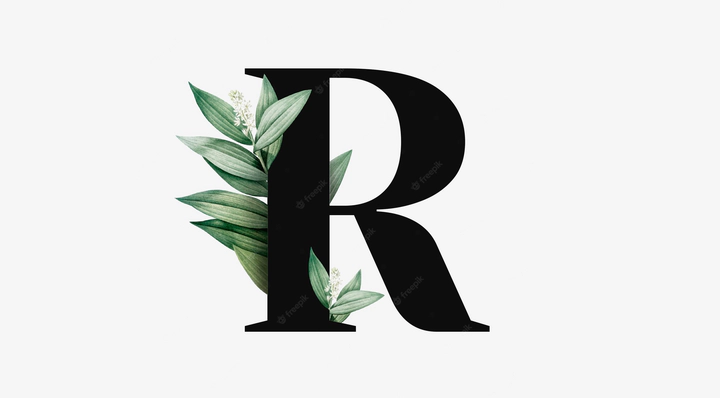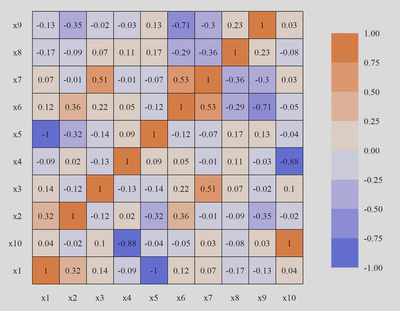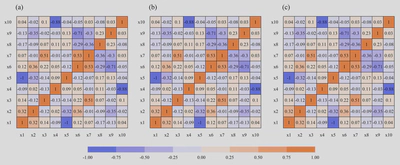R语言热图绘制模板

在熟悉绘图函数及其参数设置后,形成一套通用模板有助于提高制图效率。本文展示了两种基于R语言ggplot2包的热图绘制代码。
一、相关系数图
## library
library(ggplot2)
## read data
data <- read.csv("fig1.csv")
data$Var1 <- factor(data$Var1, levels = paste0("x",1:10))
## plot
ggplot(data = data,
mapping = aes(x = Var1,
y = Var2,
fill = value))+
geom_tile(color = "black",
linewidth = 0.2)+
scale_fill_steps2(low = "#375AE6",
mid = "white",
high = "#EB6F1A",
na.value = "grey",
breaks = seq(-1,1,0.25),
limits = c(-1,1))+
geom_text(data = data, mapping = aes(label = round(value, 2)),
family = "serif", size = 2)+
labs(x = NULL, y = NULL, fill = NULL)+
theme_bw()+
theme(text = element_text(family = "serif",
size = 7),
panel.grid = element_blank(),
panel.border = element_blank(),
legend.key.height = unit(30,"pt"),
axis.text = element_text(color = "black"),
axis.ticks = element_blank())
## save
ggsave("fig1.jpg",
width = 9,
height = 7,
units = "cm",
dpi = 600)

二、时空状态图
## library
library(ggplot2)
library(RColorBrewer)
## read data
data <- read.csv("fig2.csv")
data <- data[data$WRRCD %in% unique(data$WRRCD)[1:20],]
data <- data[data$No < 150,]
## plot
ggplot(data = data,aes(x=No,y=WRRCD,fill=PDSI))+
geom_tile() +
scale_x_continuous(expand = c(0,0),
breaks = seq(1,228,12),
labels = seq(2003.1,2021.1,1))+
scale_fill_viridis_b(n.breaks = 7)+
labs(x = "Time", y= "Watershed") +
theme_bw() +
theme(text = element_text(family = "serif",
size = 7),
panel.grid = element_blank(),
panel.border = element_blank(),
legend.title = element_blank(),
legend.margin = margin(0,0,0,0),
legend.key.width = unit(8,"pt"),
axis.ticks = element_line(linewidth = 0.3),
axis.text = element_text(color = "black"))
## save
ggsave("fig2.jpg",
width = 17,
height = 5,
units = "cm",
dpi = 800)

三、相关系数图(多图)
## library
library(ggplot2)
library(ggpubr)
## read data
data <- read.csv("fig1.csv")
data$Var1 <- factor(data$Var1, levels = paste0("x",1:10))
data$Var2 <- factor(data$Var2, levels = paste0("x",1:10))
## plotfun
plotfun <- function(data, title){
ggplot(data = data,
mapping = aes(x = Var1,
y = Var2,
fill = value))+
geom_tile(color = "black",
linewidth = 0.2)+
scale_fill_steps2(low = "#375AE6",
mid = "white",
high = "#EB6F1A",
na.value = "grey",
breaks = seq(-1,1,0.25),
limits = c(-1,1))+
geom_text(data = data, mapping = aes(label = round(value, 2)),
family = "serif", size = 2)+
labs(x = NULL, y = NULL, fill = NULL, title = title)+
theme_bw()+
theme(text = element_text(family = "serif",
size = 7),
panel.grid = element_blank(),
#plot.title = element_text(size = 7),
panel.border = element_blank(),
legend.key.width = unit(55,"pt"),
legend.key.height = unit(7,"pt"),
axis.text = element_text(color = "black"),
axis.ticks = element_blank())
}
# plot
a <- plotfun(data, "(a)")
b <- plotfun(data, "(b)")
c <- plotfun(data, "(c)")
ggarrange(a, b, c,
ncol = 3,
common.legend = T,
legend = "bottom")
## save
ggsave("fig3.jpg",
width = 17,
height = 7,
units = "cm",
dpi = 800)
